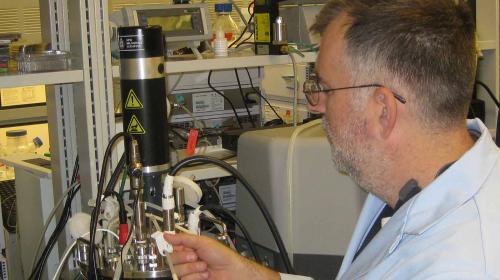Intramural Research

Priority research areas | Intramural challenge grants | Featured intramural projects
As part of the Medical Countermeasures Initiative regulatory science program, FDA scientists conduct projects funded through competitive challenge grants.
Priority research areas
-
Developing animal models and tools to evaluate safety and efficacy
-
Identifying and qualifying biomarkers for safety and efficacy
-
Using protein engineering to stabilize vaccine proteins
-
Developing methods to assess medical countermeasure product quality and related product release assays
-
Validating next-generation in vitro diagnostics platforms
-
Assessing the performance of emergency medical equipment
- Enhancing emergency preparedness and response capabilities, including tracking and evaluating the safety and clinical benefit of medical countermeasures used during public health emergencies
Intramural challenge grants
FDA’s Medical Countermeasures Initiative (MCMi) awards challenge grants to FDA researchers to further research needed to help translate the latest science and technology developments into safe, effective medical countermeasures.
Awarded through a competitive process, these grants help scientists at FDA develop the tools, standards, and approaches FDA needs to assess the safety, efficacy, quality, and performance of medical countermeasures—products that can be used to diagnose, prevent, protect from, or treat conditions associated with chemical, biological, radiological, or nuclear (CBRN) threats, or emerging infectious diseases.
Featured intramural projects
 Biomarkers for Brain Injury Monitoring
Biomarkers for Brain Injury Monitoring
Recent advances in flexible microelectronics that are wearable and conformable to the skin bring us closer to a future where portable electroencephalogram (EEG) technology could be used to detect brain injury in victims of traumatic events such as accidents or explosions. To evaluate this new technology for use in humans, FDA needs a scientific knowledge base related to validated brain injury biomarkers and models. This research could help pave the way for the development of field-deployable devices that can rapidly collect and evaluate EEG signals to diagnose traumatic brain injury.
 Decoding Ebola: Next-Generation Sequencing of the Ebola Genome for the FDA-ARGOS Database
Decoding Ebola: Next-Generation Sequencing of the Ebola Genome for the FDA-ARGOS Database
When you need a test to confirm disease in an outbreak, you need it fast. Global public health providers need additional infrastructure and tools like rapid diagnostic tests to combat emerging threats, including Ebola and antimicrobial resistant-pathogens. Next-generation sequencing technologies show promise to improve rapid diagnostic tests, and have the potential to speed development of vaccines, therapeutics and diagnostic devices—all of which would enable quicker actions to protect public health.
For more information about MCMi intramural research at FDA, email AskMCMi@fda.hhs.gov.
Center for Biologics Evaluation and Research (CBER) intramural research
- Improving Vaccine Manufacturing Evaluation for Bacterial Respiratory Pathogens
- New Ways to Predict How Well Vaccines Protect Against Tuberculosis, Tularemia and Other Bacteria That Live Inside Cells
- Developing and Evaluating Animal Models for Studying the Safety and Efficacy of Vaccines Against Anthrax, Staphylococcal Infections, and Pertussis
- Bacterial Vaccine Safety: Biomarkers of Virulence and Attenuation in Bordetella Pertussis (Whooping Cough) and Anthrax Bacteria
- Evaluating Viral Antigens and Antibody Neutralization for HIV/AIDS, Smallpox, and Influenza
- More CBER intramural research
FDA Focus Areas of Regulatory Science
The 2021: Advancing Regulatory Science at FDA: Focus Areas of Regulatory Science (FARS) report outlines topics FDA has identified as needing continued targeted investment in regulatory science research to facilitate development of innovative products, provide data and methods to inform regulatory decision-making, and improve guidance to sponsors. Public health preparedness and response is a focus area, including medical countermeasures and preparedness for emerging infectious diseases. Please contact FARS@fda.hhs.gov with questions about this initiative.
